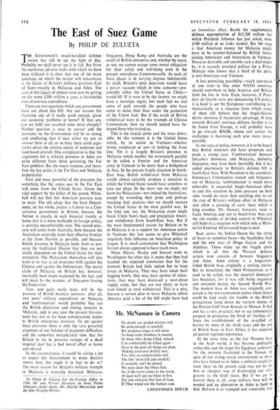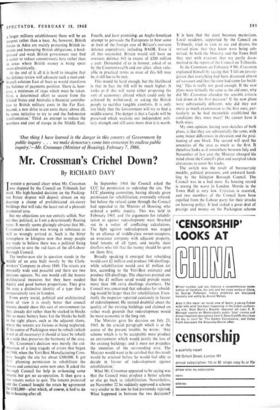The East of Suez Game
By PHILIP DE ZULUETA
rGovernment's much-heralded defence eview has still to see the light of day. Probably we shall never see it in full. But from the numerous advance leaks with which we have been titillated it is clear that one of the main questions on which the review will concentrate is the future of Britain's military positions East of Suez—mainly in Malaysia and Aden. The cost of this legacy of empire must now be getting on for some £200 million a year, a formidable item of overseas expenditure.
There are two questions which any government must ask about this bill. Are our reasons for incurring any of it really good enough, given our economic problems at home? If they are, can we fulfil our essential aims more cheaply? Neither question is easy to answer and the pressures on the Government will be so strong and conflicting that it' may either try not to answer them at all, or to bury them amid argu- ments about the relative merits of seaborne and land-based aircraft. One complication is that the arguments for a military presence in Aden are quite different from those governing the Far East problem. But the major expense, and there- fore the key point, is the Far East and Malaysia in particular.
First and most powerful of the pressures for something like the status quo in the Far East will come from the United States. Given the vital support by the dollar of the pound, White- hall will not find this American pressure easy to resist. The old adage that the State Depart- ment, on the whole, prefers a Labour to a Con- servative government in Britain, because the former is usually in such financial trouble at home that it is more malleable in foreign policy, is proving uncomfortably wise. The second pres- sure will come from Australia, both because the Australians naturally want their effective frontier as far from Darwin as possible, and because British presence in Malaysia helps them to pre- serve the traditional illusion that they are not totally dependent on the United States for their protection. The Malaysians themselves will also want us to stay as an insurance both against the Chinese and against the Indonesians. The moral claim of Malaysia on Britain has, however, inevitably been much weakened by the fact, and still more by the manner, of Singapore leaving the Federation.
Last, and quite easily least, will be the pressure of British business interests: after all, two years' military expenditure on Malaysia and 'confrontation' would probably buy out the British plantation and mining interests in Malaysia, and in any case the present Govern- ment has not so far been conspicuously tender to British enterprises overseas. To set against these pressures there is only the very powerful argument of our balance of payments difficulties and the somewhat metaphysical view that for Britain to try to preserve vestiges of a dead imperial past has a bad moral effect at home and abroad.
In the circumstances, it would be asking a lot to expect this Government to make decisive moves here, but ought it in fact to do so? The main reason for Britain's military strength in Malaysia is naturally historical. Malaysia,
Sir Philip de Zulueta left the Foreign Office in 1964. He was Private Secretary to three Prime Ministers (Lord Avon, Mr. Harold Macmillan and Sir Alec Douglas-Home).
Singapore, Hong Kong and Australia are the result of British enterprise and, whether by treaty or not, we cannot escape some moral obligation for their safety and well-being even in the present amorphous Commonwealth. As each of these places is in varying degrees indefensible by itself, Britain's total departure would leave a power vacuum which in time someone—pre- sumably either the United States or China— would fill. If it were to be the former, we might have a nostalgic regret, but need feel no real sense of guilt towards the people who have come to make their lives under the protection of the Union Jack. But if the result of British withdrawal were to be the triumph of Chinese Communism, then we should indeed have be- trayed those who trusted us.
This is the crucial point and the most debat- able. At this moment it is the United States which, by its action in Vietnam—whether wisely conducted or not—is holding the front line. Yet it is largely Britain's presence in Malaysia which enables the seventeenth parallel to be called a frontier and the American army in Vietnam to be more than a bridgehead in Asia. In the present fragile situation in South- East Asia, British withdrawal from Malaysia would almost certainly produce a situation in which the United States would have somehow to take our place. In the short run we might not harm the Malaysians—nor indeed the Australians, except by wounding their pride and perhaps touching their pockets—but we should weaken the United States in the most painful way. In the long run, too, the Malaysian straw might break Uncle Sam's back and precipitate Ameri- can withdrawal from South-East Asia. But if the most fundamental reason for Britain to be in Malaysia is as a support for American action in Vietnam, this fact seems to give Whitehall singularly little influence on American policy in Saigon. It is small consolation that Washington has not always appeared to have much more.
When Messrs. Healey and Stewart went to Washington the other day it seems that they had reached the expected conclusion that for the moment Britain had little option but to keep forces in Malaysia. They may have taken their begging bowls, they may have spoken of reduc- tions, they may have discussed a west-about supply route, but they are not likely to have even hinted at total withdrawal. This is a pity, because a serious plan to leave Malaysia unless America paid a lot of the bill might have had
an immediate effect. Beside the supplemental defence appropriation of $12,700 million for which President Johnson has just asked, even flee million or so looks modest. But the snag is that American money for Malaysia might have to be counter-balanced by British forces joining Americans and Australians in Vietnam. However desirable and sensible such a deal might be, it is scarcely practical politics for a Prime Minister who knows that a third of his party is anti-American over Vietnam.
A less promising possibility—much canvassed at one time—is that other NATO countries should contribute to help America and Britain hold the line in Asia. Even, however, if Presi- dent de Gaulle were not denouncing US policy, it is hard to see the Europeans contributing en- thusiastically to a situation from which many of them still believe that the Anglo-Saxons derive immense if mysterious advantage. If help towards Britain's overseas defence burden is to be found from Europe, it will probably have to go towards BAOR, whose cost across the exchanges is, becoming each year more insup- portable.
In one area of policy, however, it is to be hoped that British ministers did have proposals and made a strong case. 'Confrontation' between Sukarno's Indonesia and Malaysia, including Singapore, may have been inevitable, but it has•' added enormously to Britain's defence bill in South-East Asia. With Nasution in the ascendant, Indonesia's Communists routed and Singapore out of Malaysia, 'confrontation' is much more debatable. A successful Anglo-American effort to end this situation by joint pressure on both sides would do more than anything else to cut the cost of Britain's military effort in Malaysia and allow a pruning of costs there which is long overdue. Mr. Stewart, however, went to Latin America and not to South-East Asia and the old muddle of divided control in Whitehall still bedevils a situation with which only a Minis- ter for External Affairs could hope to deal.
Back across the Indian Ocean lies the string of bases or potential bases—the Seychelles, Gan and the new toys of Diego Garcia and the Aldabras. These make up the fragile chain which is all that the Western defence system now consists of between Singapore and Aden. Aden colony is a long-estab- lished British base, originally a coaling station. But its hinterland, the Aden Protectorate as it used to be called, was the imperial dinosaur's last breakfast, for if was still being organised and extended during the Second World War. The modern base in Aden was originally con- ceived as the most convenient centre where forces could be kept ready for trouble in the British protectorate lying down the western shores of the Persian Gulf from Kuwait to Muscat. It had and has a very practical, not to say commercial, purpose in protecting the flood of 'sterling oil.' Since the establishment of the so-called air barrier by most of the Arab states and the end of British bases in East Africa, it has acquired yet greater regional importance. At the same time, as the last Western base in the Arab world, it has become politically vulnerable and the target for Egyptian ambitions for the moment frustrated in the Yemen. In spite of our strong moral commitment to those who have helped us in Aden, a military establish- ment there on the present scale may not be the best or cheapest way of discharging our obli- gations to the Gulf states. But if we are to honour these at all, some military base will be needed and an alternative to Aden is hard to find. Bahrain is so cramped and vulnerable that a larger military establishment there will be.-an outpost rather than a base. As, however, British forces in Aden are mainly protecting British in- terests and honouring British obligations, a hard- pressed and weak British government may find it easier to reduce commitments here rather than in areas where British money is being spent more altruistically.
At the end of it all it is hard to imagine that the defence review will advocate such a root-and- branch solution East of Suez as would transform the balance of payments position. There is, how- ever, a minimum of steps which must be taken. First, a determined effort to secure from the United States and Australia a financial contribu- tion to British military costs in the Far East. Second, a new drive to cut costs there; above all, by some initiative to try to end the Indonesian 'confrontation.' Third. an attempt to reduce the numbers and cost of troops in the Middle East.
Fourth, and least promising; an Anglo-American attempt to persuade the Europeans to bear some at least of the foreign cost of Britain's overseas defence expenditure, including BAOR. Even if all this succeeded, Britain would still have an overseas defence bill in excess of £200 million a year. Demanded of us in honour, asked of us by the Commonwealth and our allies, often valu- able in practical terms as most of this bill may be, it still has to be met.
This would be hard enough, but the likelihood is that in fact the bill will be much higher. It looks as if this will mean either proposing the sort of economies abroad which could only be achieved by withdrawal, or asking the British people to sacrifice tangible comforts. It is only too likely that the Government will try to find a middle course. The danger is that a facade will be preserved which weakens our independent mili- tary strength and still costs more than it is worth.































 Previous page
Previous page